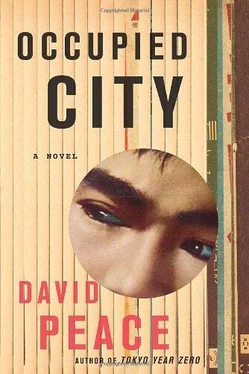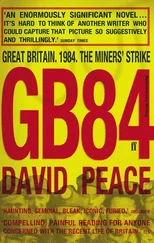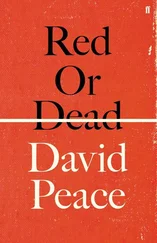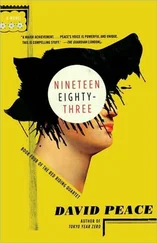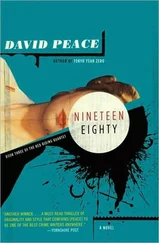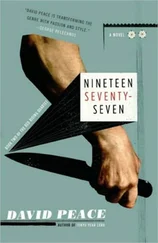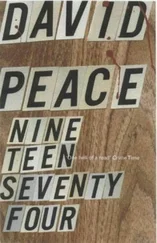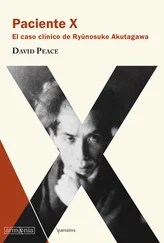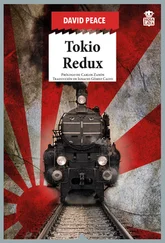In the Fictional City, so many letters and so many calls, so many stories and so many tales, so many doubts and so many, many questions.
IN THE FICTIONAL CITY, in the Seibo Hospital, there is sweat on her brow, in her hair again, shadows on her cheeks, round her eyes again. Her mouth opening and then closing, her fingers tightening and then loosening. She is dreaming, dreaming bad dreams again –
‘Help me,’ she says in her dreams. ‘Please help me …’
In this white room, her hand in mine, I say, ‘I can help you. Please believe me. I can make that dream go away …’
Pretending, impersonating, deceiving…
She opens her eyes. She stares into me. She squeezes my hand. She whispers, ‘How can you help me?’
‘I can save you,’ I tell her –
Pretending, not pretending…
‘Until yesterday,’ she says, ‘I thought a cup was a cup. Until then, a table was a table. I thought the war was over. I knew we had lost. I knew we had surrendered. I knew we were now occupied.
‘But I thought the war was over. I thought a cup was still a cup. That medicine was medicine. I thought my friend was my friend, a colleague was a colleague. A doctor, a doctor.
‘But the war is not over. A cup is not a cup. Medicine is not medicine. A friend not a friend, a colleague not a colleague. For a colleague here yesterday, sat in the seat at the counter beside me, that colleague is not here today. Because a doctor is not a doctor.
‘A doctor is a murderer. A killer.
‘Because the war is not over.
‘The war is never over.’
‘I know,’ I say, pretending to pretend, in my stolen white coat, not pretending to pretend, beside her hospital bed, squeezing her hand and telling her again, ‘I know, I know.’
‘I was still going through that day’s thirty deposits when the killer arrived,’ she says. ‘I didn’t see what time it was when he entered, but business had closed as usual at 3 p.m., and I had then immediately begun to count up the deposits. The thirty deposits would have taken me no longer than ten minutes which means the killer must have arrived sometime between 3 p.m. and 3.10 p.m.
‘When the killer began to distribute the poison, I looked him in his face. I will never forget that face. I would know it anywhere.’
‘I know,’ I say again, and again, ‘I know, I know.’
‘I am a survivor,’ she says, still staring into me, deeper and deeper, still squeezing my hand, tighter and tighter. ‘But of course I know only through luck have I survived so many friends. But night after night, in dream after dream, I hear these friends saying of me: “Those who survive are stronger.” And I hate myself …’
Again and again, she says, ‘I hate myself.’
And again, again I say, ‘I know …’
Pretending, not pretending…
‘But I will help you.’
IN THE FICTIONAL CITY, I walk down the long, long table to my editor’s desk at the head of the long, long table and I stand before him and I say, ‘I’m very sorry to disturb you, Boss …’
‘Ah, Takeuchi,’ smiles Ono. ‘Just the man I wanted to see. Liked that piece on the “Sinister Note” very much. Very much.’
‘Well, actually, that was what I wanted to talk to you about. I’m not sure it’s entirely legitimate. So I was thinking maybe you could hold it back for now while I checked into it a bit more …?’
‘Too late for doubts,’ laughs Ono, tapping his watch. ‘It’s already been set and the presses are rolling.’
‘I see,’ I say.
‘I’ve told you before,’ he tells me again. ‘You worry too much. In our business, there’s no time for doubts, no time for procrastination. Don’t get me wrong, I admire your integrity. But in our business we’ve got to go with our guts, run with our hunches, and your gut, your hunch, was to run with this. So forget it now, and get after the next one. After all, not like you made it up yourself, is it?’
IN THE FICTIONAL CITY, it is Wednesday 4 February, and I am standing outside the Seibo Hospital with all the other reporters and all the photographers. In the Fictional City, we are watching the survivors leave the hospital, watching them bow and thank the nurses and the doctors, their arms full of presents, full of flowers. In the Fictional City, all the other reporters are shouting out –
‘Mr Yoshida! Mr Tanaka! Miss Akuzawa …
‘Miss Murata! Over here, Miss Murata …’
Her eyes searching through the shouts of all the reporters, searching through the flashes of all the photographers –
‘Miss Murata! Over here, Miss Murata …’
Her lips smiling through the shouts and through the flashes, her eyes searching, lost and not smiling –
‘She’s beautiful, isn’t she?’ says Matsuda, the photographer from the Yomiuri . ‘She’ll be on every front page tomorrow …’
And now the police are leading her away through the crowds, taking her away to their car, with her arms full of presents, full of flowers, and I am walking away among all the other reporters and the photographers, with our heads full of stories, full of fictions –
‘Lucky she’s so good-looking,’ laughs Matsuda, tapping his camera, winking at me. ‘Sell more papers for us …’
In the Fictional City, back at my desk in the Yomiuri building, I stare at Matsuda’s photographs and I write another story:
POISON SURVIVORS LEAVE HOSPITAL
Happy over their narrow escape with death, the four lucky survivors of the Teikoku Bank ‘Poison Holdup’ case were discharged as fully recovered from the Seibo Hospital, Wednesday. Shown as they received presents from congratulating friends are: (Left to right) Acting Manager Yoshida Takejiro, 44, Miss Murata Masako, 22, and Tanaka Norikazu, 20. They revisited the scene of the crime to reconstruct what had taken place for the police investigators. The first inkling of the tragedy was made known when the attention of passers-by was attracted by the beautiful Miss Murata who, despite her rapidly failing consciousness, had bravely managed to drag her agonized body into the street .
I stop writing. I start reading. I stop reading–
‘I know only through luck have I survived so many friends… But night after night, in dream after dream, I hear these friends saying of me: “Those who survive are stronger.”
‘And I hate myself. I hate myself…’
I stand up. I put on my coat.
IN THE FICTIONAL CITY, it is night again, night again as I walk her streets, as I hear her stories, from Nihonbashi up to Hongo, from Hongō and onto Kasuga-dōri, along Kasuga-dōri then down Shinobazu-dōri, down Shinobazu-dōri and onto Mejiro-dōri, along Mejiro-dōri onto Yamate-dōri, Yamate-dōri to Shiinamachi –
But I do not go to the scene of the crime, I go to her house, Murata Masako’s house. In this Fictional City, in its long, long night, I stand across the street from her house. Is she awake? Her house is dark. Or is she sleeping? The lights off. Dreaming? The curtains closed. Dreaming that dream again?
‘And I hate myself. I hate
The footsteps in the shadows, the grip on my shoulder, the voice at my back, ‘Who are you? What are you doing here?’
I try to turn, the grip too tight –
‘Don’t move, just talk!’
‘I’m a journalist,’ I say. ‘From the Yomiuri.’
The hand inside my coat, inside my jacket, my pocket now my wallet. The grip relaxed, a torchlight on –
I spin round, shove him in his chest, snatch back my wallet and now say, ‘Who are you?’
The man smiles, the man before me, in his hat and in his cape, and he bellows, ‘I am Shimizu Kogorō, Occult- Tantei . Head of the Nagasaki branch of the Mejiro Security Association …’
Читать дальше
